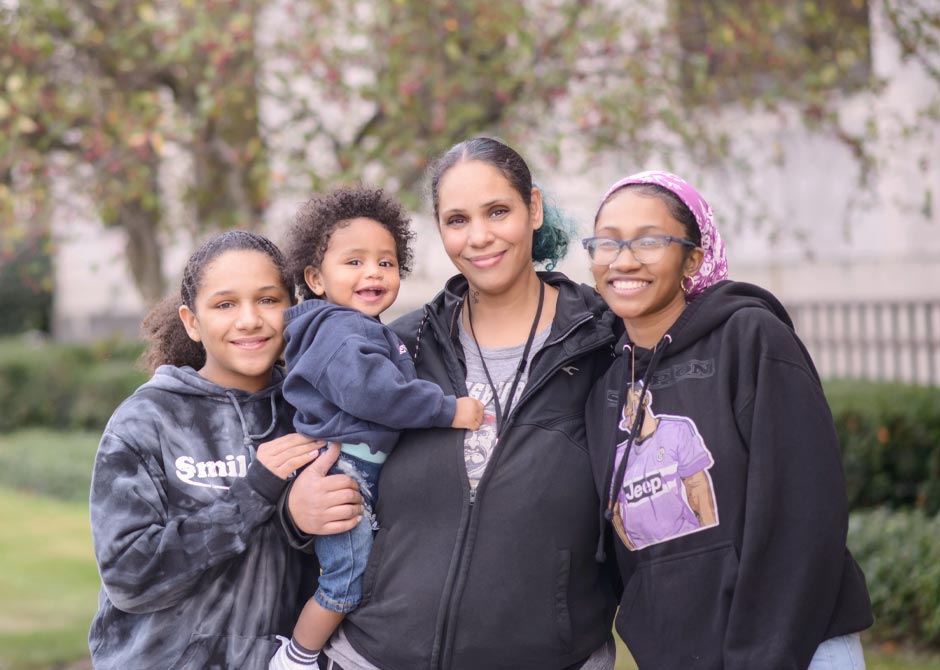 What we do
What we do
Our Purpose:
To improve the health status of historically disadvantaged communities by empowering pregnant women to deliver full term healthy babies and to eliminate disparities in infant mortality. Moms2B addresses the social and clinical determinates of health and inspires future health care providers to serve with empathy.
Our Goal:
The goal of Moms2B is for all participants to deliver healthy, full-term infants that live to celebrate their first birthday. Moms2B encourages all pregnant women to participate and invites them to stay in the program during their infant’s first year of life.
Our Approach:
Moms2B educates through a multidisciplinary team approach. Health care professionals, including doctors, nurses, social workers, dietitians, lactation counselors, navigators, community health workers and health care students, listen and learn from everyone attending Moms2B.
The education topics, specifically designed to address concerns and questions of Moms2B participants, focus on:
- Breastfeeding
- Nutrition
- Stress reduction
- Child development
- Family planning
- Goal setting
- Early prenatal care
- Labor and delivery
- Maternal-infant health
- Positive parenting
- Reproductive health
- Safe sleep and more!
Each program session is delivered in a supportive environment, encouraging and empowering moms to take ownership of their choices, often leading to newfound independence after the baby’s delivery and beyond.
Moms2B even provides a healthy and hot meal with every session. This supplements the diets of participants, their support person and their other children, as 85% report experiencing food shortages at home within the past year. On-site free supervised playtime is also provided for all program participants; this allows moms to engage and interact not only with the education, but also with fellow participants. Preregistration is not required. Please call 614-292-1605 for more details.
About Moms2B
The Moms2B program was founded in 2010 by:
- Patricia Gabbe, MD, pediatrician, clinical researcher and professor
- Twinkle French Schottke, infant mental health specialist and program director
Moms2B is a proven group model and has made significant positive impacts on infant mortality in Franklin County. Since the program began, the infant mortality rate in Franklin County has improved from 9.6 in 2011 to 6.9, based on data from Columbus Public Health. This most recent data is the first time the IMR has dropped below 7.0 annually in the past decade and suggests that programs that address infant deaths, including Moms2B, are making an impact. However, like the rest of Ohio, racial and ethnic disparities persist, represented by the infant mortality rates for blacks and whites disparity ratio of 2.6 for 2019.
Moms2B can reach more pregnant moms in high-risk areas through our virtual sessions. Because of COVID19, we have started weekly Zoom sessions with our moms. We are determined to continue our educational program and support during this trying time. We are always accepting new pregnant moms to the program.
Making a difference
The Moms2B program continues to grow:
- Over nine years, more than 2,500 pregnant women have attended at least one of our Moms2B sessions.
- In 2019, we welcomed 600 new, expectant Moms.
- On average, 120 pregnant and parenting women attend one of our locations weekly.
- Women attending Moms2B have babies born at healthier weights and fewer born prematurely.
- When carefully studied by Ohio State biostatisticians, a group of 675, predominantly African American (72%) Moms2B gave birth to fewer low birthweight babies (9.5% vs 12% expected) and had fewer preterm births.
- Moms2B has also welcomed many sets of twins and one set of triplets.
Program founder, Patricia Gabbe, MD, MPH, on the women in Moms2B:
- “Their resilience, positive attitudes and strength in the face of such incredible obstacles inspires me to stay committed to our program and try to make a positive lifelong difference for them.”
Beyond the obvious relief of delivering a healthy baby, there are significant financial implications as well:
- Reducing prematurity results in significant cost avoidance for the Medicaid program.
- The medical costs for a premature or low birthweight infant is approximately $55,000 in the first year of life alone. Whereas the medical costs for an infant born full term is less than $4,000 annually.
- With our impact on decreasing the number of babies born preterm or low birthweight, we estimate a cost savings for Medicaid of at least $300,000 per year.

